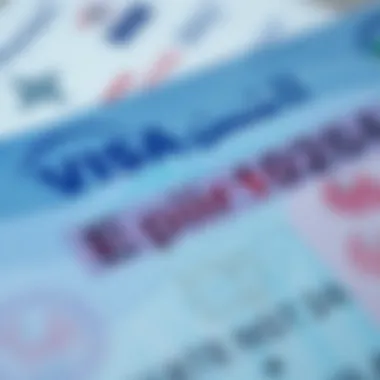Checking Expiry Dates for UAE Visas: A Guide


Intro
Navigating the complexities of visa regulations in the UAE can be tricky. For expatriates and professionals alike, being aware of your visa expiry date is not just a matter of convenience—it's essential for maintaining compliance and ensuring your stay in the UAE is uninterrupted. Misunderstanding or overlooking this critical detail could lead to unnecessary fines or legal implications, detracting from an otherwise vibrant living experience in the Gulf state.
In this article, we strive to walk you through the nuances of checking your UAE visa expiry date. We will discuss the steps to perform checks, provide information about the implications of expiry dates, and emphasize the significance of keeping informed about your visa status. After all, knowledge is power, especially when it concerns your legal status in a foreign land.
Market Trends
Current Market Analysis
In the bustling landscape of the UAE, it's crucial to stay updated regarding visa regulations and their implications on expatriate life. The demand for skilled workers continues to surge, making the visa process more streamlined as various sectors—including technology, finance, and healthcare—look to attract global talent. This ongoing evolution indicates a robust market for expatriates.
Work visas often come with specific conditions regarding duration and renewals that depend on both employer sponsorship and individual qualifications. Industry trends indicate that companies favor longer-term sponsorships for skilled professionals. Hence, understanding how your visa expiry impacts your job security and residency options is vital.
Future Predictions
As the UAE positions itself as a global hub for business and innovation, experts predict continued changes in visa policies. Looking ahead, the government is likely to introduce even more flexible policies aimed at attracting a diverse pool of talent. We might see initiatives focused on easing the renewal processes, tweaking regulations, or even creating specialized visas for niche professionals. Keeping abreast of these developments can offer valuable insights to expatriates, professionals, and investors that might affect their status in the country.
How to Check Your Visa Expiry Date
To ensure you stay on top of your visa timeline, knowing how to check your expiry date is paramount. Here are stepwise instructions:
- Visit the Official UAE Government Portal: Go to the official portal (smart.gov.ae) and navigate to the visa services section.
- Login: Enter your credentials if required; some sections may need access verification.
- Select Visa Check Option: Look for the service to verify visa details. This could be under "Status Check" or "Visa Validity."
- Input Required Information: Key in necessary details like your visa number, passport number, and nationality to retrieve your visa information.
- Review the Data: Once the system displays your details, check the expiration date listed.
It's good practice to certify this information periodically, especially if your visa conditions are linked to your employment or residency status.
Implications of Expiry Dates
Ignoring expiry dates can spell trouble. A visa expiry can result in fines, legal actions, and in some cases, a reentry ban. Conversely, staying proactive about your visa timeline allows you to explore options like renewals or adjustments that formalize your stay peacefully.
Think of it as keeping a tab on your car's oil changes. Skipping maintenance can eventually lead to costly repairs—or in this case, complicated legal issues. Understanding the importance of your visa's lifespan is crucial.
"Being unaware of your visa status can sometimes feel like flying a kite without checking the wind conditions. It only takes a good gust for everything to unravel."
In sum, grasping your visa expiry details provides clarity and peace of mind.
For additional insights on visa regulations, visit Gulf News or UAE Government. Keeping these resources handy can prove beneficial in navigating the intricate world of visa management.
Prelude to UAE Visa Regulations
Navigating through the labyrinth of visa regulations in the UAE is crucial for both expatriates and residents. With a diverse population drawn from every corner of the globe, understanding the complexities of visa regulations can mean the difference between smooth sailing and potential legal obstacles. Knowing the ins and outs of UAE visa regulations not only empowers individuals but also significantly enhances their experience in the country.
First and foremost, keeping abreast of visa regulations ensures that individuals remain compliant with local laws. Expiry dates are not merely numbers; they carry weight in legal terms. Letting a visa lapse could lead to fines, complications with residency, or even deportation—a thought that no one wants to entertain. This issue becomes especially dire in a place like the UAE, where the cultural and legal landscape can be vastly different from that of one’s home country.
Furthermore, understanding these regulations translates to better planning for the future. For example, investors eyeing opportunities in the UAE or homeowners looking to settle down need clarity on how visa regulations can impact their long-term plans.
"Staying informed about visa statuses is a critical piece of the puzzle for managing one's stay in the UAE effectively."
Essentially, this section serves as a primer for comprehending wider visa categories, the requirements laid out, and the legal implications of overstaying. The UAE's regulations also evolve, making it imperative to adapt continually. Therefore, understanding the basics lays a solid foundation for diving deeper into specific types of visas and their respective regulations.
Choosing to remain updated fosters an environment where one can focus on more enriching experiences, be it a business venture or navigating social dynamics with ease. Listing out key benefits of understanding UAE visa regulations can highlight its significance:
- Legal Compliance: Avoid fines or legal issues that could arise from expired visas.
- Future Planning: Make informed decisions about residency or investments.
- Peace of Mind: Focus on professional and personal goals without the constant worry of visa expiration.
To sum up, a firm grasp on UAE visa regulations serves as an essential stepping stone for anyone looking to thrive in this vibrant region. It establishes a sense of security and control over one’s stay, making life in the UAE not just bearable but prosperable.
Types of Visas in the UAE
When it comes to navigating life in the UAE, understanding the various types of visas is crucial. Each visa category serves a unique purpose, and knowing the distinctions can save you time and potentially, a headache down the line. This section will dissect the types of visas available, from tourist visas to work visas, helping expatriates and investors alike make informed decisions. With the right knowledge, you can enhance your experience in the UAE.
Tourist Visas
Tourist visas are specifically designed for individuals wanting to explore the UAE for leisure purposes. Holding a tourist visa allows travelers to soak in the myriad attractions— from the majestic Burj Khalifa to the tranquil shores of Abu Dhabi’s beaches. The duration typically varies between 30 to 90 days, but here’s the kicker: the exact requirements may depend on your nationality.
For instance, citizens from certain countries can obtain a visa on arrival, making it a walk in the park for them. But if you're from somewhere else, you might need to sort it out in advance through a hotel or travel agency. This makes it essential to check and understand your options before packing your bags.
Residence Visas
Residence visas provide expatriates with a means to reside legally in the UAE for an extended period. These visas are often sponsored by employers or family members and can open avenues not just for living, but for employment, education, and healthcare as well. The validity can range from one year to several years, depending on the sponsorship and the profession.
Furthermore, having a residence visa can demystify several day-to-day processes, like opening a bank account or securing a driving license. It's a ticket to participating fully in the vibrant life that the UAE offers. Keep in mind the relevance of maintaining your residency status — let it lapse, and you could be walking a fine line, impacting your ability to stay in the country.
Work Visas
For those seeking employment, a work visa is often a non-negotiable requirement. Usually sponsored by an employer, this visa allows you to legally work in the country for a specified period. The application process can be a bit tedious—there's paperwork, approvals, and maybe even a medical test on the cards. However, it’s the pathway to career growth and financial stability in the UAE.
Notably, you must adhere to your job role and employer outlined in the visa; varying from the original agreement could expose one to legal repercussions. An understanding of this visa type not only empowers job seekers but also sets clear expectations for professional commitments across the board.
Transit Visas
On the other hand, we have transit visas—often overshadowed but definitely worth mentioning. These short-term visas are granted to individuals who stop in the UAE while en route to another destination. A transit visa usually lasts for a couple of days and can be an excellent opportunity to explore the vibrant Emirati culture without being locked in long.


To qualify for a transit visa, travelers generally need to confirm onward travel, often within 48 hours. While it may seem like a slip of a visa type, it holds significance for many globetrotters wanting to make the most of their journey.
Understanding the various types of visas is key to unlocking a smooth experience while navigating life in the UAE. Be informed and plan accordingly to avoid unexpected delays or complications.
In summary, the types of visas in the UAE cater to a wide spectrum of needs. Whether you're a holidaymaker, an aspiring expatriate, or simply passing through, knowing what each visa entails can ease your journey. This understanding lays the groundwork for further discussions about visa validity and the implications of staying compliant with UAE regulations.
The Importance of Visa Validity
Visa validity reflects much more than just a date on a piece of paper. It acts as a compass guiding expatriates and residents through the often complex landscape of UAE immigration regulations. Understanding when a visa expires is crucial, as it impacts not only the legal standing of individuals but also their ability to travel freely within the region. A valid visa can be seen as a ticket to stability, allowing individuals to focus on their professional endeavors and lifestyle choices without the anxiety of legal repercussions looming over them.
Legal Implications
When one considers the legal implications, it becomes clear that the importance of visa validity cannot be overstated. Expiring visas can lead to serious legal consequences. For instance, many believe that a minor lapse in a visa may not be a big deal; however, even a single day overstay can result in hefty fines, penalties, and potential bans from re-entering the country.
This is particularly true in the UAE, where laws regulating immigration are significant and strictly enforced. Should an individual be found violating visa regulations, consequences may include:
- Fines: Daily penalties can stack up quickly, leaving individuals in substantial financial trouble.
- Inadmissibility: A history of overstaying can lead to difficulties in obtaining future visas or re-entry permits.
- Legal Action: In severe cases, overstaying can result in arrest or detention, leading to a lengthy legal ordeal.
It is imperative for expatriates and travelers alike to familiarize themselves with the expiration terms and conditions specified in their visa approval documentation. Staying informed aids in dodging legal pitfalls, ensuring that all paperwork remains up-to-date and compliant.
Impact on Residency and Travel
In addition to the legal aspects, expired visas can have a significant impact on residency status and future travel plans. For expatriates looking to make the UAE their long-term home, an expired visa can complicate residency applications and renewal processes. Once an individual’s visa lapses, their residency status may be compromised, causing a ripple effect in their personal and professional lives.
Furthermore, having an expired visa can thwart individuals' ambitions to travel or work abroad. With travel restrictions imposed on overstaying individuals, even short trips outside the UAE could inadvertently lead to a ticklish situation when returning.
To ensure smooth transitions:
- Regularly review visa expiration dates and set reminders ahead of time.
- Be proactive in seeking visa renewal options well in advance to avoid a lapse.
Staying informed about your visa expiry is not just an administrative task; it is a crucial component of effective life management in a thriving metropolis.
For more information, visit the official UAE government portal at www.gov.ae and familiarize yourself with current laws and guidelines surrounding visa regulations.
How to Check Your UAE Visa Expiry Date
Understanding how to check your UAE visa expiry date is crucial for both expatriates and residents alike. Knowing the validity of your visa ensures that you remain compliant with local laws, which in turn protects you from potential fines or legal implications. As the saying goes, "an ounce of prevention is worth a pound of cure." Keeping tabs on your visa's expiry date is not merely about avoiding fines; it also prevents complications with residency status and travel plans.
Being aware of your visa status can save you a world of trouble later on. Whether you are planning a trip abroad or considering a job change, an up-to-date visa is essential. This section breaks down the methods to check your visa expiry, which can be categorized into online and offline options.
Online Methods
Official Government Portal
The Official Government Portal for the UAE is a central hub for various immigration services, including checking your visa status. This platform stands out because it is directly managed by government authorities, ensuring reliability and up-to-date information. One key characteristic of this portal is its user-friendly interface, which simplifies the process of checking visa expiry dates.
Users can access this portal from any device, be it a computer or mobile, making it a convenient choice for many. The unique feature here is the ability to view not just your visa expiry date, but also other relevant details like your visa type and conditions of stay. However, users might encounter certain drawbacks such as the need for an Emirates ID number to log in, which could be a barrier for some.
Mobile Applications
Mobile applications also play a significant role in checking UAE visa expiry dates. The UAE government has launched several apps tailored for expatriates, and among these is the popular GDRFA Dubai App. This app stands out due to its real-time updates and push notifications regarding visa status changes. It’s quite beneficial, as it allows users to receive alerts and reminders about their visa status directly on their phones.
The app's unique feature is the ability to perform multiple tasks, such as paying fines or booking appointments, all through one platform. While this is incredibly convenient, it’s worth noting that users need to maintain a stable internet connection, which might not be available to everyone at all times.
Offline Methods
Visiting Immigration Offices
Visiting immigration offices offers a tangible approach to checking your visa expiry date. Although it may seem less convenient compared to online methods, it still holds importance. Embarking on this journey allows individuals to interact directly with officials who can provide comprehensive assistance. The main characteristic of visiting these offices is personalized customer service, where you can ask questions specific to your situation.
One of the unique features of this method is the ability to clarify any misunderstandings or complex issues regarding your visa. However, the downside includes long waiting times and potential relocation issues. Not everyone has the luxury of time, especially busy professionals and investors who are juggling various responsibilities.
Consulting Employment Sponsors
For those employed in the UAE, consulting employment sponsors can be a straightforward way to check your visa expiry date. Your employer typically has access to your visa information and can assist you with the details. This method is beneficial especially if you have a good relationship with your HR department; they can help you navigate the often complex visa regulations with ease.
The key characteristic of this approach is that it offers a contextual understanding of your visa's expiration in relation to your employment contract. A unique feature here is the opportunity for company-sponsored renewals or extensions, which simplifies the process substantially. However, relying solely on your employer may be problematic for those who have recently changed jobs or are self-employed.
Common Challenges When Checking Visa Status
Navigating the visa landscape in the UAE can sometimes feel like wading through molasses. There are hurdles that individuals encounter, and understanding these challenges is important. This section explores the common problems people face when checking their visa status, providing clarity on how to get past these roadblocks.
Technical Issues
When it comes to tech issues, the digital age can be a double-edged sword. While online resources for checking visa statuses are abundant, they are not always reliable. Websites may experience downtime or lag due to high traffic or maintenance schedules. Such glitches can delay your ability to access crucial information about your visa expiry.
Here's a list of common technical problems:
- Website Errors: These can range from server overloads to miscommunication between databases.
- Login Difficulties: Sometimes users cannot access their accounts due to forgotten passwords or username mismatches.
- Incompatibility with Browsers: Certain sites may not function well with all web browsers.
If you find yourself faced with these issues, the best course of action is to have backup options. Always jot down your visa details in case you need to visit an immigration office in person. Furthermore, don’t hesitate to reach out to customer support for assistance.
Insufficient Documentation


Imagine sitting down to check your visa online, only to find that you're missing important documents. Insufficient documentation can be a major roadblock. Visa processes in the UAE are meticulous, and any missing paper or file can lead to delays or complications in checking your status.
Here are a few key documents that are often required:
- Passport Information: Your passport number and its expiry date are usually needed.
- Visa Number: This unique identifier helps in fetching your visa data.
- Personal Information: Details like your name and date of birth might be requested for identification.
If you fail to provide the necessary documentation, you might end up going down a rabbit hole of bureaucracy, which can be quite a headache. Always ensure that your documents are current and accessible. Keep a digital copy in addition to any physical versions; that way, whenever you check your status, you won’t find yourself scrambling through papers.
Understanding Visa Grace Periods
Visa grace periods are crucial in navigating the landscape of UAE immigration laws. They allow individuals who are nearing the end of their valid visa terms some leeway to either renew their visa or finalize their departure without facing penalties immediately. Understanding these grace periods can save you from unexpected troubles and help with better planning for your stay or exit from the country.
What is a Grace Period?
A grace period refers to the time following the expiration of your visa during which you can remain in the UAE without incurring penalties. This period typically lasts for a limited time, often around 30 days, but can differ based on the type of visa you hold. The key element here is that the grace period isn't a second chance; it’s merely a cushion to help you sort out your immigration matters.
For example, let’s say you are holding a tourist visa that expires on the 15th of a month. Depending on the grace period provided by the authorities, you might have until the middle of the following month to either leave the country or switch to a different visa type without facing fines. It is essential to check with the relevant authorities about the specifics of the grace period for your situation, as failing to do so can lead to consequences that may affect future visa applications.
Navigating Overstay Consequences
When it comes to overstaying a visa beyond the grace period, the ramifications can be severe. The UAE has stringent policies regarding visa overstays, which can range from financial penalties to potential blacklisting from entering the country in the future.
If you find yourself in a position where your visa is expiring soon, here's what to keep in mind:
- Know Your Timeline: Make sure to track the exact expiry date of your visa along with the length of your grace period so that you can plan accordingly.
- Financial Penalties: Overstaying can incur daily fines, and these accumulate quickly. It is not unusual for the fines to exceed the cost of renewing a visa.
- Legal Implications: If authorities catch you beyond your grace period, you may have to deal with complicated legal processes, and in some cases, you could be barred from applying for any new visa for a specified period.
"It's better to be proactive than reactive; keeping a close eye on your visa status can save a lot of headaches later on."
Renewing Your UAE Visa
Renewing your UAE visa is more than just a bureaucratic procedure; it holds significant relevance for anyone looking to stay compliant with the laws and regulations of the UAE. When dealing with visa matters, especially in a landscape where rules can change almost overnight, understanding the renewal process can save you from pitfalls and keep your residency status intact. Adequate preparation for the renewal can lead not only to peace of mind but also to the avoidance of potential legal troubles.
Timely renewal of your visa can ensure continued access to numerous rights and privileges, such as the ability to live and work in the UAE without interruptions. Not renewing on time can lead to penalties, and in worst-case scenarios, deportation. With that in mind, let’s go over the essential documentation needed and the step-by-step process to make your renewal as smooth as possible.
Necessary Documentation for Renewal
When it comes to renewing your UAE visa, having the proper documentation is a non-negotiable condition. Without the right papers, you risk delays or even denial of your application. Here are the primary documents you will likely need:
- Original passport: Your passport should be valid for at least six months beyond your existing visa expiration date.
- Visa application form: This can usually be obtained online or at designated government offices.
- Photographs: Recent passport-size photos that meet UAE specifications are generally required.
- Proof of residency: This could be a utility bill or rental agreement in your name if you are applying locally.
- Employment verification: If you are on a work visa, a letter from your employer stating your employment status and salary may be required.
- Health insurance: Evidence of valid health insurance coverage is often mandatory for residency renewals.
Gathering these documents well in advance of your renewal deadline can ease the process significantly. It's always good to check any specific requirements that may pertain to your particular case to avoid running around at the last minute.
Step-by-Step Renewal Process
Now that you understand the documentation requirements, let’s delve into the step-by-step renewal process:
- Collect all necessary documents: Ensure that you have gathered every document listed in the previous section.
- Complete the application form: Fill out the visa application form either online via the government portal or in-person at an immigration office. Double-check for accuracy to avoid unnecessary rejections.
- Submit your application: Depending on your preference, submit your application either through an online portal or directly at the immigration office. Sometimes, you can also go through your sponsor or employer if you're on a work visa.
- Pay the applicable fees: Be prepared to make a payment, which can vary based on the type of visa you are renewing. This can often be done online.
- Wait for processing: After submission, your application should go through a review process. The duration can vary, so be patient.
- Receive your renewed visa: Once approved, your new visa can be issued electronically or physically, depending on your application.
Keep in mind that tracking your application status online can be achieved through the official government portal. This lets you stay in the loop without the anxiety of waiting indefinitely.
Following these steps not only ensures that you remain within legal bounds but can also simplify your living situation in this bustling emirate. Being proactive about your visa renewal can open doors and keep you on solid ground in the dynamic landscape of UAE residency.
Potential Fees Associated with Expired Visas
Understanding the financial implications of visa expiry in the UAE is essential for anyone residing or working in this vibrant region. The costs not only encompass immediate penalties but can ripple into extensive financial burdens if not managed correctly. Ignoring the expiration date of your visa can lead to fines and other complications that can affect your status in the country.
Fines for Overstay
In the UAE, overstaying your visa can trigger hefty fines, which can accrue rapidly. The basic charge for overstaying is a fine of 200 AED for the first day, and for every subsequent day, an additional 100 AED is added. This can quickly escalate into a significant amount if you lose track of the expiration date. For example, if you overstay for a week, you could be looking at fines totaling 1,200 AED or more.
Here are crucial points to consider regarding overstaying fines:
- Awareness: Check your visa status regularly to avoid unintentional overstay penalties.
- Payment Timeliness: Prompt payment of fines can prevent complications such as arrest or deportation.
- Curfew Risks: Depending on your visa type, overstaying can lead to restrictions on your ability to work or travel, putting additional strain on your finances.
"Being proactive with your visa management is more effective than playing catch-up."
Cost of Renewal Applications
Renewing your visa is sometimes a necessity that comes with its own set of fees. The cost for renewing a visa varies greatly depending on the type of visa held and its duration. On average, renewal can range from 300 AED to about 1,200 AED. For residence visas, a notable cost is associated with the medical tests required, adding another layer to the overall expense.
The following elements should be taken into account for visa renewal costs:
- Government Fees: This includes all fees payable to immigration authorities, which can differ based on the emirate in which you reside.
- Medical Examination Fees: Often required for visa renewal, these fees can catch many unaware.
- Service Charges: If using an agency for renewal, service charges may apply, increasing the total cost further.
Staying ahead of these charges can lead to a much smoother experience and help you maintain your legal standing in the UAE. Keeping abreast of the visa renewal process and associated fees can save time, money, and a heap of troubles in your ongoing residence or travel plans.
Visa Cancellation Process
Visa cancellation is a critical aspect of managing immigration status in the UAE. Understanding this process enables expatriates and investors to navigate the legal landscape effectively, avoiding potential penalties and unintended consequences. A proper cancellation ensures you remain compliant with UAE immigration rules, which can have significant implications for re-entry, future visa applications, and even financial liabilities.
Understanding Visa Cancellation
When we speak of visa cancellation in the UAE, it’s essential to distinguish between voluntary and involuntary cancellations. Voluntary cancellations happen when a visa holder decides to leave the country or change their residency status. On the other hand, involuntary cancellations can occur due to violations of visa regulations or failure to comply with UAE laws.


It’s worth noting: Understanding these distinctions can help you navigate the process more smoothly. The UAE takes visa compliance seriously, and mishaps can lead to legal troubles.
Why Cancellation Matters
- Legal Compliance: Failing to properly Cancel a visa can result in bans from re-entering the UAE or difficulties securing future visas.
- Financial Implications: If you overstay without cancelling, fines accrue daily, which could add up to a hefty sum before you even realize it.
- Future Opportunities: Those who cancel their visa appropriately will find it easier to apply for another visa or residence permit later.
Steps for Proper Cancellation
The procedure for cancelling a UAE visa may seem daunting at first, but breaking it down into manageable steps can simplify the process. Here’s a comprehensive guide to ensure you execute this properly:
- Gather Required Documents: Before heading to the appropriate government office, make sure you have:
- Visit the Relevant Authority: Depending on the type of visa you hold:
- Submit Your Application: Present your documents and request cancellation. Be ready to fill out specific forms for processing.
- Pay Fees: Understand that cancellation may incur fees that vary based on visa type and the duration of your stay.
- Receive Confirmation: It’s vital to ensure you receive a cancellation notice. This document confirms that your visa has been officially cancelled. Don’t overlook this step, as it serves as a safeguard for your future immigration status.
- Keep Records: Recordkeeping is crucial. Store your cancellation confirmation securely; it’ll be handy for any future dealings with UAE immigration authorities.
- Your original passport.
- The UAE visa that you wish to cancel.
- A no-objection letter from your employer, if applicable.
- For work visas, go to the Ministry of Human Resources and Emiratisation.
- For residency visas, the General Directorate of Residency and Foreigners Affairs (GDRFA) in your emirate will be the right place.
By following these steps carefully, individuals can avoid unnecessary complications and hold onto peace of mind when dealing with their visa status in the UAE. Keeping informed and being proactive about visa management can save a world of trouble in any expatriate's journey.
Travel Implications of Visa Expiry
When it comes to living and working in the UAE, understanding the implications of an expired visa is a critical aspect that cannot be overlooked. An expired visa can lead to several complications that affect travel plans, ability to enter the country again, and future visa applications. It’s essential for expatriates, investors, agents, and homeowners to grasp these implications to make informed decisions.
Re-entry Challenges
Once your visa expires, re-entering the UAE could become a bumpy road. Usually, a valid visa is necessary to board your flight back to the UAE. Without it, you might find yourself in the unfortunate position of being denied boarding by your airline. If you manage to reach the UAE without the proper documentation, immigration authorities are likely to turn you around at the airport.
In case of an expired visa, even if you decide to exit the UAE temporarily, you may face challenges upon re-entering the country. Immigration officers might question why you were out of compliance, and your previous overstays could lead to further scrutiny.
"Staying on the right side of immigration laws is crucial in the UAE. One misstep could lead to more hurdles down the line."
It’s advisable to keep your visa status updated before planning any trips abroad. Consider the potential delays and restrictions involved with rectifying an overstayed visa or applying for a new one once in a tricky situation.
Visa Application Denials
If your visa expires while you’re in the UAE or you have an overstayed visa, you may put future visa applications at risk. Not having a valid visa can tarnish your record, leading to an automatic denial for new applications or attempts to modify your existing visa status.
When applying for a new visa, officials may see past errors regarding your visa compliance as a red flag. This situation can become even more problematic for those wishing to upgrade their visa status or transition from one type of visa to another, such as changing from a tourist visa to a work visa.
Here’s how an expired visa may affect your application:
- Negative Record: Past overstays can severely decrease your chances of approval.
- Increased Scrutiny: Expect thorough checks on your history, which can delay processing times.
- Ineligibility for Waivers: There may be limited options to waive application fees or fines, making it an expensive affair.
Thus, it is crucial to keep a close eye on your visa's expiry date. Regular checks and setting reminders can save you from significant inconveniences, both short and long-term.
Documenting Your Visa History
Keeping an eye on your visa history is not just an administrative nicety; it's a vital component in managing your life in the UAE. As expatriates and travelers dance through the intricate bureaucracy of visa regulations, having a solid grasp of your visa history can make all the difference in navigating challenges and avoiding pitfalls. It’s not merely about avoiding overstays or fines; it’s about knowing where you’ve been and where you can go next.
Understanding your visa history provides you with key insights into your legal standing in the UAE. This knowledge can protect your rights as you work, travel, or reside in the Emirates. Tracking your visa duration, updates, or past renewals can serve as a roadmap, steering you clear of unintentional oversights that might lead to unnecessary complications.
Importance of Accurate Record Keeping
Maintaining precise records of an individual’s visa journey cannot be overstated. By systematically documenting each visa's validity, expiration dates, and renewals, you fortify your situation against a range of bureaucratic challenges. Lapses in record-keeping can lead to missed deadlines or unexpected legal troubles.
To set it straight, here are a few reasons why accurate record keeping is indispensable:
- Avoid Misunderstandings: A clear history helps you easily reference when you entered, exited, or renewed your visa.
- Facilitate Applications: Accurate records are essential when applying for new visas or renewals. They provide necessary data like previous visa numbers and durations.
- Support Legal Compliance: Being well-informed reduces the risk of unknowingly infringing on regulations which could lead to penalties.
Documented histories can also prove invaluable should you ever face scrutiny from immigration authorities or require documentation for employment or residency applications. By keeping your records in check, you not only comply with legal expectations but also empower yourself, ensuring that you never find yourself in proverbial hot water.
Utilizing Digital Tools
In this digital age, tools that simplify the tracking and managing of visa histories abound. Many expatriates are integrating technology into their lives, and tapping into digital resources can streamline the management of visa records significantly.
Utilizing digital tools comes with its own unique array of advantages, including:
- Accessibility: Cloud-based storage solutions like Google Drive allow you to access your documents from anywhere, making them readily available when needed.
- Organization: Platforms such as Notion or Trello can help you categorize visa-related documents, reminders, and timelines effectively.
- Alerts and Notifications: Several apps or calendar programs can be set up to remind you of upcoming expiry dates, ensuring timely actions.
Here’s a potential method to help get organized:
- Keep copies of all relevant documents (like your visa, passport pages, and renewal confirmations) in a folder on a cloud app.
- Use a simple spreadsheet to track visa durations, renewals, and notes for future reference.
By leveraging technology, expatriates can maintain a more effortless oversight of their visa journey while ensuring compliance and mitigating any potential issues. This proactive approach not only puts control back in your hands but also grants peace of mind in a fast-paced environment.
Remember: Accurate documentation is the bedrock of a smooth visa management journey in the UAE. Invest time in it to avoid future faul-ups.
Closure
When it comes to managing your UAE visa, staying informed about expiry dates is not just a matter of convenience; it’s a necessity. As we've traversed through various sections of this article, the weight of maintaining visa validity has become abundantly clear. Understanding your visa’s expiration brings forth a multitude of considerations that can save you from unnecessary legal hassles and financial penalties.
First off, knowing when your visa expires helps you plan ahead. Whether you’re an expatriate gearing up for a business trip or a homeowner considering a vacation, being aware of your visa timeline allows you to make sound travel arrangements. Getting a leg up on your application renewals or cancellations keeps your status above board, preventing unwanted stress.
Moreover, the risks tied to not checking your visa's expiry date can be substantial. Laws in the UAE regarding overstays can lead to hefty fines or even bans on re-entry. This article emphasizes the importance of keeping a close watch on your visa status and the various methods available for checking it—online and offline. Armed with the right knowledge, anyone can deftly navigate the complexities of UAE visa regulations.
Furthermore, the facilitation of documents related to your visa history is an essential step. Maintaining accurate records not only aligns with legal expectations but also simplifies processes when dealing with future applications or durational tasks. Technology, in this age, serves as a useful ally, with digital tools at your disposal to streamline record-keeping and retrieval, as discussed earlier.
In closing, by proactively managing your visa expiration dates, you bolster your ability to enjoy life in the UAE without looking over your shoulder. This necessity transforms into peace of mind, enhancing your overall experience. Therefore, whether you are an investor eyeing commercial opportunities or an expatriate enjoying your life abroad, keeping tabs on your visa is crucial. Your journey in the UAE should be free from unnecessary complications, making each moment a step toward achieving your aspirations.
"An ounce of prevention is worth a pound of cure." In the landscape of UAE visa regulations, this saying rings true. So keep an eye on those expiry dates, and your future will unfold with renewed possibilities.









